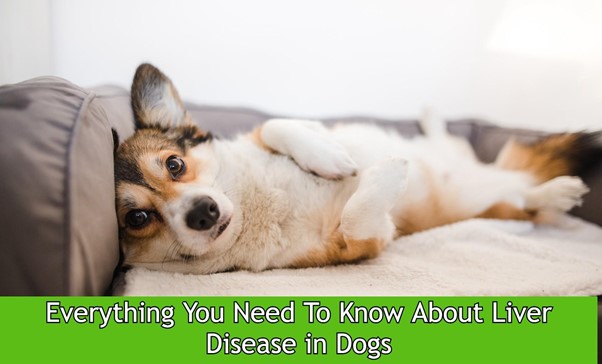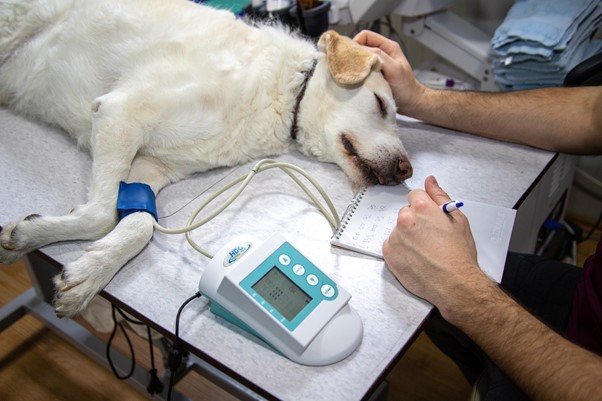The Risks of Liver Disease in Dogs and How to Prevent It
- Last updated on April 18, 2023
- By: Caroline Stowe
Liver disease in dogs is a serious and potentially life-threatening condition.
It can be caused by viruses, toxins, and parasites, but it can also be a result of an unhealthy diet and lifestyle.
It is important to be aware of the signs and symptoms of liver disease so that you can get your pet evaluated as soon as possible if they show any indications of having an issue.
Knowing the types, causes, diagnoses, and treatments for liver diseases will help you make informed decisions on when to seek veterinary assistance and how to care for your dogs.
Let’s take a look at what liver disease is, its potential causes, and best practices for prevention.

What Is Liver Disease in Dogs?
Liver disease in dogs, also known as Canine Liver Disease (CLD), is a general term used to describe any type of illness or disorder that affects the liver.
This can range from chronic inflammation of the organ to damage caused by toxins, viruses, or parasites.
In some cases, hereditary or congenital abnormalities are responsible for liver dysfunction.
It is important to understand the different types of liver disease in order to make an accurate diagnosis and provide appropriate treatment.
Types of Liver Disease in Dogs
Chronic Hepatitis
Chronic hepatitis is a type of liver disease where long-term inflammation or trauma leads to gradual damage and destruction of the organ’s cells and tissues.
This can be caused by a variety of conditions such as parasites, viruses, drugs and toxins, autoimmune diseases, or genetic disorders.
Acute Hepatitis
Acute hepatitis is a rapid onset of severe inflammation that results in the destruction of the liver’s cells and tissues.
It is often caused by exposure to infectious agents such as bacteria, viruses, or parasites. It can also be caused by medications, toxins, or physical trauma.
Copper-Associated Hepatopathies
Copper-associated hepatopathies are a group of diseases in which excessively high levels of copper accumulate in the liver tissues and cause damage.
This type of liver disease is usually inherited and is more common in certain breeds such as the Bedlington Terrier and the Skye Terrier.
Cirrhosis
Cirrhosis is a chronic, irreversible condition in which the liver becomes scarred due to long-term damage. It can be caused by excessive alcohol intake, viral hepatitis, or drug toxicity.
This type of liver disease can lead to serious complications including jaundice, ascites (fluid buildup in the abdomen), and hepatic encephalopathy (a condition caused by a build-up of toxins in the brain).
Liver Shunts
Liver shunts are abnormal connections between the blood vessels that supply the liver and veins that bypass the organ.
This type of liver disease is usually congenital (present at birth) and can lead to the accumulation of toxins in the body due to inefficient filtering by the liver.
Causes of Liver Disease in Dogs
Infectious Agents
Infectious agents such as viruses, bacteria, parasites, or fungi can lead to cause of liver disease in dogs.
Viruses such as canine distemper virus (CDV), canine parvovirus (CPV), and canine adenovirus type 1 (CAV-1) can cause acute inflammation and tissue damage.
Bacteria such as leptospira and salmonella, parasites such as Echinococcus granulosus, and fungi such as Aspergillus can also cause liver disease.
Toxins
The ingestion of certain toxins found in food or the environment can lead to liver damage. Common toxins include acetaminophen, antifreeze, mushrooms, and snail bait.
Genetic Disorders
Certain genetic disorders can lead to liver dysfunction. Copper toxicosis is an inherited disorder in which the body accumulates excessive amounts of copper in the liver, leading to tissue damage and scarring.
Fructose intolerance is another genetic disorder that results from a deficiency of the enzyme responsible for breaking down fructose, leading to the buildup of toxic levels of fructose in the liver.
Autoimmune Diseases
Autoimmune diseases such as systemic lupus erythematosus (SLE) can cause chronic inflammation and destruction of the liver’s cells and tissues.
In SLE, the body’s own immune system mistakenly attacks its own organs and tissues. This can lead to damage to the liver cells, resulting in inflammation and scarring.
Learn more about liver diseases in dogs by clicking the link below.
Signs and Symptoms of Liver Disease in Dogs
Jaundice
One of the most common and recognizable signs of liver disease in dogs is jaundice, which is a yellowish discoloration of the skin, mucous membranes, and whites of the eyes.
It is caused by an accumulation of bile pigments in the blood. This can be a sign of infection, inflammation, or other liver diseases.
Loss of Appetite
Dogs with liver disease may lose their appetite and become lethargic, as the liver isn’t able to process toxins as efficiently and can thus be overwhelmed by them.
Weight Loss
If a dog is not eating, it will likely begin to lose weight as its body is not receiving the nutrients it needs.
Due to the toxins build up in the bloodstream, other symptoms that may indicate liver disease include:
- Vomiting and diarrhea
- Abdominal swelling
- Bad breath
- Weakness and exercise intolerance
- Unusual behavior (changes in behavior such as confusion, disorientation, or aggression)
- Increased drinking and urination
- Seizures
Diagnosing Liver Disease in Dogs

If a dog shows any signs or symptoms of liver disease, it is important to have them evaluated by a veterinarian as soon as possible. Diagnosing liver disease in dogs can be done using a variety of methods.
Physical Examination
A veterinarian will begin by performing a physical examination of the dog to observe any abnormalities or signs of illness. During this exam, they will look for jaundice, abdominal swelling, poor coat quality, and other signs of liver disease.
Blood Tests
A complete blood count and biochemistry panel can be used to detect abnormalities that may indicate a problem with the dog’s liver or overall health.
The CBC and biochemical profile are used to look for signs of anemia or infection, which can indicate liver disease.
These tests can also help the veterinarian rule out other causes of the symptoms.
Imaging Tests
X-rays, ultrasounds, and CT scans can be used to create images of the liver so that any abnormalities or problems can be identified.
Biopsy
A biopsy is a sample of tissue taken from the liver, which is then examined under a microscope. This is the most definitive way to diagnose liver disease, as it can identify the specific type of liver disease present.
Abdominal Ultrasound
An abdominal ultrasound is a non-invasive imaging technique that allows the veterinarian to assess the size, shape, and texture of the liver.
Other Specialized Testing
In some cases, additional testing may be needed to help diagnose liver disease. This could include a bile acid test, liver function test, urinalysis, or a copper storage disease test.
Canine Liver Disease Treatment Options
Diet and Nutrition
Feeding a high-quality, low-protein diet that is formulated specifically for dogs with liver disease can help to reduce the number of toxins in the body and improve overall health.
This can include supplements such as omega fatty acids, antioxidants, probiotics, and amino acids to help support liver health.
Additionally, the veterinarian may recommend a low-sodium diet to help reduce the strain on the kidneys.
Medications
Depending on the type and severity of the liver disease, medications may be prescribed to provide symptom relief and help improve overall health.
This could include antibiotics to treat infections, anti-inflammatory drugs to reduce inflammation, or medications to help improve liver function.
Surgery
In some cases, surgery may be needed to remove tumors or abscesses in the liver, as well as to correct any blockages that are preventing blood from flowing properly through the liver.
Liver Transplant
In severe cases of liver disease, a liver transplant may be necessary. This is a complex and costly procedure, but it can significantly improve the quality of life for dogs with advanced stages of liver disease.
Prevention of Liver Disease in Dogs
Vaccination
Regular vaccinations can help protect against some of the most common liver diseases in dogs, such as hepatitis and leptospirosis.
It is important to stay up-to-date with your dog’s vaccinations, as some of these diseases can be life-threatening if not treated quickly.
Proper Diet and Exercise
A balanced diet that is appropriate for your dog’s age, breed, and activity level can help keep its liver healthy.
Additionally, regular exercise can help improve overall health and prevent obesity, which can put additional strain on the liver.

Regular Veterinary Visits
Routine visits to the veterinarian can help catch any issues early before they become serious.
During these visits, the vet can perform a physical exam to look for any signs of liver disease and order necessary tests if needed.
Avoid Toxic Substances
It is important to keep your dog away from any substances that are known to be toxic to them, such as certain plants, medications, or chemicals.
Additionally, it is important to limit their access to alcohol and other drugs that can cause liver damage.
Conclusion
Liver disease is a serious health condition for dogs that can have long-term effects if not treated promptly. Fortunately, there are steps you can take as a pet owner to help protect your pup from developing this condition.
By following good preventive care guidelines—such as regular vet checkups, keeping up with vaccinations, and providing healthy nutrition and exercise—you will be taking proactive steps toward protecting your four-legged friend’s health!
If you have any concerns about your dog’s health—including possible signs of liver disease—don’t hesitate to contact your vet right away for further advice and treatment options.
-
Author: Caroline Stowe
- Updated on April 18, 2023
Disclaimer: This article doesn’t intend to replace professional veterinary advice, nor should it be used as a substitute for veterinary services, diagnosis, or treatment. The content on this website, including information and opinions expressed herein, are intended for general informational purposes only. In case you have concerns or questions regarding your dog’s health and diet requirements, please consult your veterinarian before doing anything that might affect it.
DogPetGuide.com and the writer are not responsible or liable for any damage, liability, costs, or claims arising from any possible consequences of the reader’s action after reading this article.




